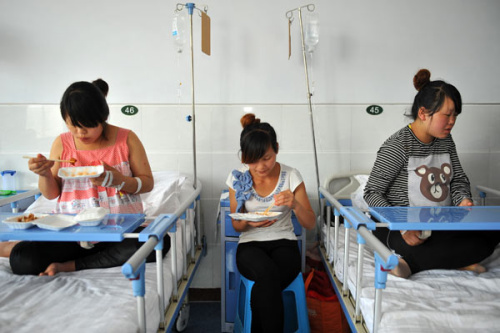
Pregnant women eat lunch at a county hospital in Fugu county, Shaanxi province. Basic medical insurance covered more than 95 percent of the Chinese population in 2011, forming the largest basic medical insurance network in the world. LIU XIAO / XINHUA
Unified system urgently needed to protect migrants, report He Na in Beijing and Han Junhong in Jilin.
An inflamed pancreas was the jab in the side Zhao Zhiqiang needed to realize that health insurance was a good idea.
"It was like torture. It was really painful, and even though it was more than six months ago, I'm still afraid of hospital drips," said the 52-year-old farmer from Huangdi village in Jilin city.
"But the most painful experience was when the nurse told me there wasn't enough money in my hospital account to cover the cost of the medicine. That happened quite a few times," he recalled.
"I wanted to pull out all the drips and go home," Zhao said.
His 23 days of hospital treatment cost more than 22,000 yuan ($3,500), almost an entire year's income for a farmer.
However, thanks to the New Rural Cooperative Medical Care System, he only had to pay about one-third of that.
Because Zhao had always been reluctant to join the insurance system, the treasurer of the program was surprised when he was the first to pay up this year.
Now Zhao has been helping persuade hesitant or unwilling villagers to join the program.
"My son had just got married and we had borrowed a lot of money from relatives to build the new house, hold the wedding and pay a dowry. If the government hadn't reimbursed most of the health cover, I would definitely have been refused treatment. It saved my life," he said.
"Before the attack, I always thought I was in good health. I thought that joining the health insurance plan would be a waste of money. It wasn't until I benefited from it that I realized it was money well spent," he said.
Statistics from the National Health and Family Planning Commission show that between the first trials of the insurance program in 2003 and the end of June 2012, more than 812 million rural residents - around 95 percent of all rural residents - were listed under the system.
"A lot of people who've worked in the fields for a long time have chronic illnesses. Afraid of spending money, they would rather endure pain than visit the doctor. It's a vicious circle that can eventually lead to serious, or even fatal, illness. The increase in the level of reimbursement provided by the New Rural Cooperative Medical Care System, or NCMS, has greatly improved the health of rural residents and their standard of living," said Liu Minghui, vice-president of the school of public finance and taxation at Dongbei University of Finance and Economics, who has conducted research into medical insurance and urbanization for more than a decade.

Copyright ©1999-2011 Chinanews.com. All rights reserved.
Reproduction in whole or in part without permission is prohibited.